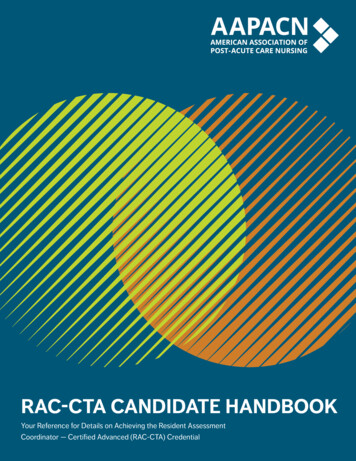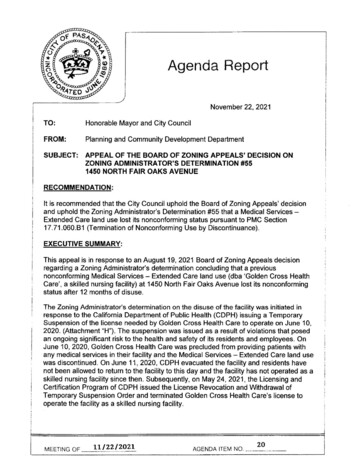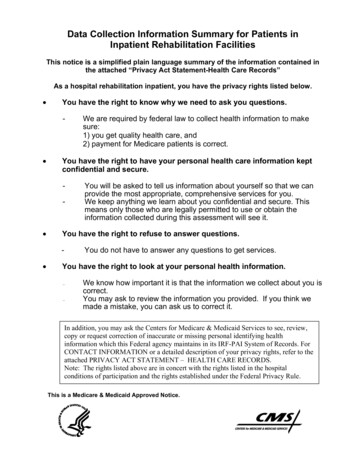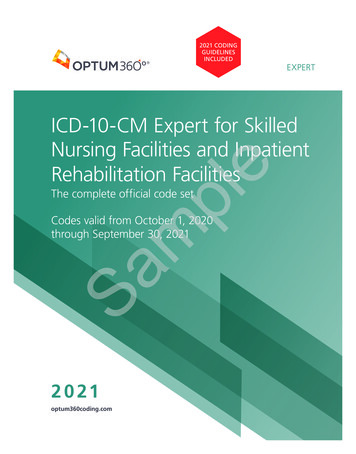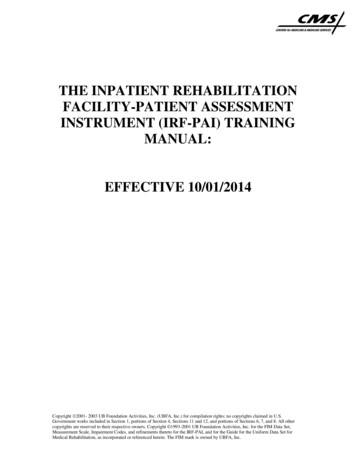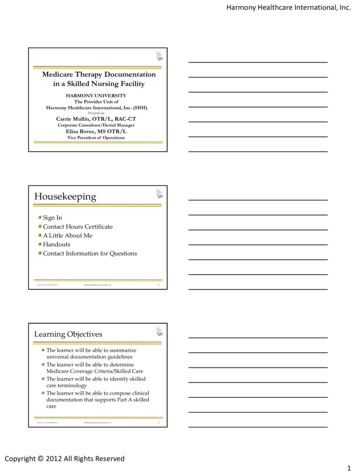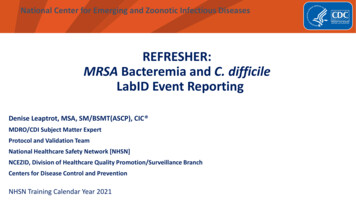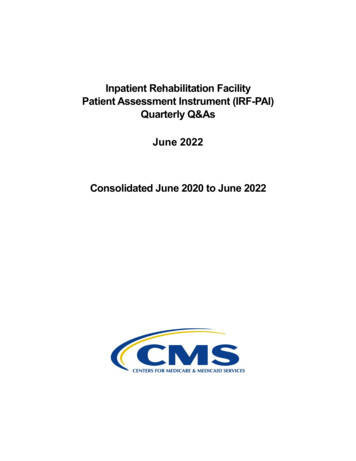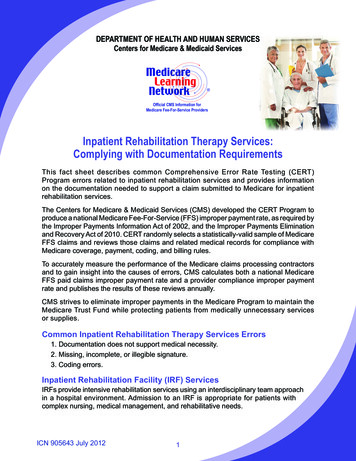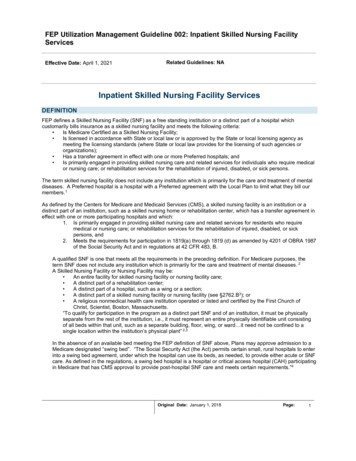
Transcription
FEP Utilization Management Guideline 002: Inpatient Skilled Nursing FacilityServicesEffective Date: April 1, 2021Related Guidelines: NAInpatient Skilled Nursing Facility ServicesDEFINITIONFEP defines a Skilled Nursing Facility (SNF) as a free standing institution or a distinct part of a hospital whichcustomarily bills insurance as a skilled nursing facility and meets the following criteria: Is Medicare Certified as a Skilled Nursing Facility; Is licensed in accordance with State or local law or is approved by the State or local licensing agency asmeeting the licensing standards (where State or local law provides for the licensing of such agencies ororganizations); Has a transfer agreement in effect with one or more Preferred hospitals; and Is primarily engaged in providing skilled nursing care and related services for individuals who require medicalor nursing care; or rehabilitation services for the rehabilitation of injured, disabled, or sick persons.The term skilled nursing facility does not include any institution which is primarily for the care and treatment of mentaldiseases. A Preferred hospital is a hospital with a Preferred agreement with the Local Plan to limit what they bill ourmembers.1As defined by the Centers for Medicare and Medicaid Services (CMS), a skilled nursing facility is an institution or adistinct part of an institution, such as a skilled nursing home or rehabilitation center, which has a transfer agreement ineffect with one or more participating hospitals and which:1. Is primarily engaged in providing skilled nursing care and related services for residents who requiremedical or nursing care; or rehabilitation services for the rehabilitation of injured, disabled, or sickpersons, and2. Meets the requirements for participation in 1819(a) through 1819 (d) as amended by 4201 of OBRA 1987of the Social Security Act and in regulations at 42 CFR 483, B.A qualified SNF is one that meets all the requirements in the preceding definition. For Medicare purposes, theterm SNF does not include any institution which is primarily for the care and treatment of mental diseases. 2A Skilled Nursing Facility or Nursing Facility may be: An entire facility for skilled nursing facility or nursing facility care; A distinct part of a rehabilitation center; A distinct part of a hospital, such as a wing or a section; A distinct part of a skilled nursing facility or nursing facility (see §2762.B3); or A religious nonmedical health care institution operated or listed and certified by the First Church ofChrist, Scientist, Boston, Massachusetts.“To qualify for participation in the program as a distinct part SNF and of an institution, it must be physicallyseparate from the rest of the institution, i.e., it must represent an entire physically identifiable unit consistingof all beds within that unit, such as a separate building, floor, wing, or ward it need not be confined to asingle location within the institution’s physical plant” 2,3In the absence of an available bed meeting the FEP definition of SNF above, Plans may approve admission to aMedicare designated “swing bed”. “The Social Security Act (the Act) permits certain small, rural hospitals to enterinto a swing bed agreement, under which the hospital can use its beds, as needed, to provide either acute or SNFcare. As defined in the regulations, a swing bed hospital is a hospital or critical access hospital (CAH) participatingin Medicare that has CMS approval to provide post-hospital SNF care and meets certain requirements.”4Original Date: January 1, 2018Page:1
Effective Date: April 1, 2021Page:2 of 8FEP UM Guideline 002: Inpatient Skilled Nursing Facility ServicesUM GUIDELINE1.For Members enrolled in Basic Option and Federal Employee Program (FEP ) Blue Focus:Benefits are not available for inpatient Skilled Nursing Facility (SNF) care for individuals enrolled in BasicOption.2.For Members enrolled in Standard Option and in Medicare Part A primary:FEP Benefits are available for inpatient SNF care for individuals enrolled in Standard Option and inMedicare Part A primary. Benefits are provided when Medicare has made a payment and are limited tocoverage of the first through 30th day of confinement for each benefit period as defined by Medicare.Medical necessity is considered met when Medicare Part A has made a payment for the stay.3.For Members enrolled in Standard Option:FEP benefits are available for inpatient SNF care for individuals enrolled in Standard Option and who arenot enrolled in Medicare Part A primary for a maximum of 30-days, annually, when the following criteriaare met:a.Patient can be expected to benefit from the short term SNF services with a goal of returning home.b.Patient is enrolled in case management prior to admission to the SNF.i.Member is enrolled in case management prior to admission to the SNF (signed consentrequired).ii.Patient and/or proxy must participate in case management prior to and during the patient’sadmission to the SNF.c.Precertification is obtained prior to admission (including overseas admissions).d.The preliminary treatment plan is approved prior to admission.i.Treatment plan must include proposed therapies and need for daily inpatient SNF care.ii.Assessment of functional status and development of preliminary SNF plan of care must beperformed prior to admission to the SNF and must address any issues/conditions in theitems below:1.Neurological and cognitive status;2.Musculoskeletal status and functional mobility;3.Cardiopulmonary status;4.Integumentary assessment (noting the absence of impairments or if present,providing details, including staging, measurements, etc. of impaired integrity);5.Medications and therapies;6.Renal status;7.Mental Health status;8.Nutritional and gastrointestinal status, including ability to swallow and digest; andthe need for special diets;9.Psychosocial assessment; and10. Educational needs.Assessment may be performed by providers where patient is receiving treatment priorto proposed transfer to the SNF (i.e., hospital RN and PT caring for the patient).iii.Medication reconciliation must occur between the transferring facility, receiving SNF, andPlan case manager prior to admission to the SNF.
Effective Date: April 1, 2021Page:3 of 8FEP UM Guideline 002: Inpatient Skilled Nursing Facility Servicesiv.e.Treatment plan includes: documentation of need for daily inpatient care, estimated lengthof stay; medical and rehabilitation therapies (including frequency) to be provided during thestay; preliminary short and long-term goals; and plan for discharge (including services andlocation).Patient participates in all treatment and care planning activities, including dischargeplanning/transition to home.Note: The 30 day/calendar year SNF benefit available to members enrolled in Standard Option who are notenrolled in Medicare Part A primary does not require a minimum inpatient hospital stay.Benefits are not available for inpatient SNF care solely for management of tube feedings, for home leveldialysis treatment, as an interim transition to long-term care placement, etc., or for any non-covered services.Benefits are not available for court ordered placement in a skilled nursing facility.4.The SNF must be able to provide the nursing, rehabilitative, respiratory, nutritional, educational,pharmacological, and behavioral health services indicated for the individual patient in a manner consistentwith standards of care.Note: The above reference to behavioral health services does not imply SNF admission is appropriate formanagement of behavioral health conditions. It is intended to convey the expectation that a facility must havethe resources available for assessment and management of an individual patient with behavioral healthneeds related to their physical illnesses (i.e., depression due to alteration in functional status).5.The SNF must be able to provide the Local Plan with regular reports of the patient’s progress towards goalsand the status of the discharge plan at the intervals determined by the local Plan.a. Reports must be provided no less than weekly and must include:i. The progress note(s) from the physician, nurse practitioner, or physician’s assistantcoordinating care for the patient in the SNF (as defined by regulations and respectivepractice acts). For patients on ventilators or admitted for tracheostomy weaning, this mustalso include the weekly note(s) from the pulmonologist.ii. Medication reconciliation, including current medications and patient education related tomedications.iii. Rehabilitation therapy activities: therapy frequency (treatment logs), patient participation,functional status, etc.iv. Wound care activities (if applicable): treatment, frequency, wound assessment(measurements, stage, etc.), patient/family education, etc.6.Skilled nursing facility (SNF) services for members not enrolled in Medicare Part A primary are medicallynecessary when ALL the criteria in item 3 above are met; ALL of the following criteria in Section A are met;and one or more of the subsections (care categories) in Section B are met:Section A:1. Inpatient SNF care is ordered by a physician and provided under the supervision of a physician.a. Attending physician’s admission orders, documentation the patient requires covered SNF care on adaily basis, and review of preliminary treatment plan must occur within 72 hours of the patient’sadmission to the SNF.b. Patient is seen at least weekly by the supervising physician, nurse practitioner, and/or physician’sassistant (as defined by regulations and respective practice acts).i. If the patient is admitted on a ventilator or for tracheostomy weaning, the patient must beseen at least weekly by the pulmonologist directing the patient’s respiratory care.2. Care delivery requires an interdisciplinary clinical team.3. Patient does not reside in a nursing home or similar facility as a long-term care resident.4. Prior to admission to the SNF, the admission is determined by the Local Plan to be medically necessary forthe treatment of the individual’s illness or injury (i.e., be consistent with the nature and severity of theindividual’s illness or injury, the particular medical needs and accepted standards of medical practice); andthe inpatient admission is considered reasonable in terms of duration and quantity.5. Patient/proxy agrees with the proposed treatment plan, short and long term goals, and discharge plan.
Effective Date: April 1, 2021Page:4 of 8FEP UM Guideline 002: Inpatient Skilled Nursing Facility Services6.7.8.9.10.11.12.13.14.If hospitalized, patient is not projected to be at a home care, outpatient, or intermediate, long-term care, orresidential level of care within the next 48-72 hours.In the absence of an approved SNF admission, it would be medically necessary for the patient to remain inthe acute inpatient care setting for more than 48-72 hours and/or if discharged from the hospital, the memberis at high risk of readmission within 30 days of the hospital stay immediately preceding SNFadmission.Patient is medically stable.For patients whose primary SNF need is rehabilitation, patient does not have an infectious disease requiringisolation in a private room that limits patient participation in rehabilitative therapies.Patient requires skilled nursing and/or skilled rehabilitation services that must be performed on an inpatientbasis by professional health personnel (RN, LPN, PT, OT, or SLP); the services must require the judgment ofa qualified and appropriately licensed provider; anda. Patient requires these skilled services on a daily basis, 7 days/week. (See section B)b. SNF admissions solely for physical rehabilitation meet the daily basis requirement when:i. Skilled rehabilitation services (physical and occupational therapy from a licensed therapistare received at least 5 days/week for a minimum combined total of one (1) hour/day, andii. Patient also requires skilled nursing care (i.e., medication management, patient teaching,monitoring of condition, wound care, etc.).c. Admissions that are not primarily for rehabilitation must meet the following requirements:i. Patient requires multiple skilled treatments daily (at least three times/day, see Section B).Patient is able to follow commands and to participate in rehabilitation therapies and patient teaching activitiesregarding care.The inpatient SNF services are expected to result in significant, continuous, and measurable improvement inthe patient’s medical condition or functional capabilities within a reasonable and defined period of time.The services needed are not such that a person not medically skilled could perform them safely andreasonably with training, or that mainly assist the individual with daily living activities, such as:a. Personal care, including help in walking, getting in and out of bed, bathing, eating (by spoon, tube,or gastrostomy), exercising, or dressing;b. Homemaking, such as preparing meals or special diets;c. Moving the individual;d. Acting as companion or sitter;e. Supervising medication administration; orf. Treatment or services that any person can perform with minimal instruction, such as recording pulse,temperature, and respiration; simple wound care; or administration and monitoring of feedingsystemsDuring the inpatient SNF admission, patient participates as expected in the treatment plan.Section B: (Medical records must provide evidence the patient meets criteria in at least one of the subsectionsbelow)A.Rehabilitative Care1. Therapy is intended to treat a documented decline in functional status due to recent illness, injury,disease, or surgical procedure(s).2. Patient is able to actively participate in one or more therapy disciplines (Physical and/orOccupational Therapy) at least 1 hour/day, at least five days/week. Active participation includesevidence the patient’s ability to respond to verbal or visual stimuli and the ability to followcommands.A. During the inpatient SNF stay, the patient must receive and actively participate inindividualized (1:1) medically necessary physical and/or occupational therapy by a licensedtherapist (PT, OT) or therapy assistant (PTA, OTA) for a minimum combined total of one (1)hour/day at least five days/week; andB. If clinically indicated, patient is able to participate in and receives individualized, medicallynecessary speech therapy by a licensed therapist at least 3 days/week.3. Patient requires more than light physical assistance for mobility and basic activities of daily living(i.e., bathing, dressing, eating, and toileting that can be managed by Home Health care).4. Patient requires minimum or greater level of assistance with mobility in more than one area ofphysical function (i.e., ambulation and transfers).5. Within twenty four (24) hours of admission to the SNF, the patient receives a physical therapyevaluation; a therapy treatment plan is developed and implemented; and short and long term
Effective Date: April 1, 2021Page:5 of 8FEP UM Guideline 002: Inpatient Skilled Nursing Facility Servicesfunctional goals are developed and agreed to by the patient (or patient proxy if patient is unable togive consent).B.Daily Nursing Care and Management1. Inpatient skilled nursing care is required for ongoing assessment and management of unstable orcomplex medical conditions, including need for treatment modifications until the patient’s condition isstabilized (i.e., septicemia, uncontrolled pain, severe respiratory disease, etc.); and2. Complex teaching and training with the individual or caregiver requiring 24-hour inpatient skilledsetting (i.e., new ostomy, administration of multiple newly ordered infused and/or injectedmedications, wound care for a Stage 3 and/or Stage 4 wound or multiple Stage 2 wounds).C.Injections and infusions1. Medically necessary administration of multiple intravenous (IV), intramuscular (IM) and/orsubcutaneous (SQ) medications for new and/or complex needsA. At least one of the medications is administered every 8 hours or more frequentlyNote: Inpatient SNF care is considered not medically necessary for routine medicationadministration, such as insulin, or previously established infusions.D.Ventilator and/or tracheostomy1. Active weaning of the ventilator and/or tracheostomy or patient/caregiver education to prepare forpatient return to a home setting (other than long-term care) with ventilator and/or tracheostomy; and2. Patient care requires availability of a respiratory therapist on site in the SNF 24 hours/day; and3. Respiratory management is directed by a pulmonologist who evaluates patient within 12 hours ofadmission and at least weekly thereafter.E.Respiratory Treatment other than tracheostomy or ventilator1. Patient care requires respiratory therapy available on site in the SNF 24 hours/day; and2. Chest Physiotherapy (PT) at least three (3) times/day;3. New respiratory treatments to stabilize new medical conditions, including new use of oxygen andrespiratory nebulization therapies more than three (3) times/day;4. Nasopharyngeal or tracheal suctioning on a frequent basis (i.e., at least every four hours).F.Ostomy Care1. Management of and patient/caregiver education regarding a new colostomy or ileostomy during theearly post-operative period and/or related to complications to prepare patient for home.A. Management and teaching must be at a level that cannot be performed in an alternativecare setting, such as the patient’s home, long-term care facility, outpatient, etc.G. Complex Wound Care1. Extensive treatment (i.e., packing, debridement, irrigation) of Stage 3, Stage 4 or multiple Stage 2decubitus ulcers or other complicated wounds);2. Complex treatment of wounds requiring multiple dressing changes within a 24 hr. period (at leastevery 8 hours) and the treatment cannot be safely performed in the outpatient, home, or long-termcare facility setting; or3. Complex treatment of extensive skin disorders, requiring frequent treatment (at least every 8 hours)and skilled observation and assessment.Skilled observation and assessment of each wound must be documented daily and reflect any changesin the wound status.Note: Benefits are not available for admissions for training and management of enteral feedings, TPN/PPN, homelevel dialysis treatment, and similar care.Not Medically NecessaryA skilled nursing facility (SNF) setting is considered not medically necessary when any one of the following ispresent:
Effective Date: April 1, 2021Page:6 of 8FEP UM Guideline 002: Inpatient Skilled Nursing Facility Services do not meet the criteria above;Patient is not participating in the treatment plan (i.e., not participating in rehabilitation therapies, patienteducation, etc.);Patient’s family, proxy, and/or caregiver is not participating as provided in the treatment plan;Patient has not demonstrated practical improvement in the level of functioning within a reasonable period oftime;Patient is ambulatory/mobile for household distances (70 feet or more) with less than minimal assistance, andis capable of performing activities of daily living with less than minimal assistance;Services are provided to preserve the present level of function or prevent regression of functions for anillness, injury or condition that is resolved or stable;Care is primarily for routine services directed toward the prevention of injury or illness;Routine or maintenance medication administration, such as insulin, oral medications, eye drops, nebulizationtreatments, and oxygen;Medication administration and treatments in medically stable individuals that could be managed in the homesetting, including wound care, physical therapy; IV medications administered by a home health or homeinfusion therapy provider, even though the home setting is not available, a caregiver is not present, etc.;Care solely for the administration of oxygen, intermittent positive pressure breathing (IPPB) treatments and/ornebulizer treatments for stable respiratory conditions;Routine enteral feedings and/or TPN/PPN;Routine colostomy care;Custodial care, including custodial care performed by a licensed practical nurse (LPN) or registered nurse(RN);Nasotracheal or nasopharynx suctioning less frequently than every four hours when infection is not presentand there are no other conditions meeting the medically necessary criteria (i.e., active ventilator weaning);Medically stable ventilator care that can be safely provided in an alternative setting, such as the home orlong-term care facility, even though the home setting is not available, a caregiver is not present, etc.;The presence of a stable indwelling or suprapubic catheter, the need for routine intermittent straightcatheterization or ongoing intermittent straight catheterization for a chronic condition, catheter replacement orroutine catheter irrigation when there are no other conditions meeting the medically necessary criteria.Wound care requiring daily dressing changes that can safely be performed in the outpatient setting.Benefit Limitations: Skilled nursing facility benefits are only available for covered services listed under the benefitprovision in the Service Benefit Plan brochure. Benefits are not available for custodial care, maintenance care, or otherservices listed as general exclusions under the contract. SNF benefits are not available for members enrolled inStandard Option who are not enrolled in Medicare Part A primary when any of the following are present:1.2.3.4.5.6.7.8.Precertification is not obtained prior to admission;The patient declines Case Management enrollment and/or ongoing collaboration with the Plan case manager;The member/proxy has not signed the consent for case management after reasonable attempt by the casemanager to obtain the written consent;The patient and/or family refuse to participate in the recommended treatment plan;Care is initially or has become custodial;The care can be safely provided by a non-medical person (i.e., service can be safely and effectively selfadministered or performed by the average non-medical person without the direct supervision of a nurse, eventhough a nurse may perform the care).Home setting is not available, home setting is not suitable, caregiver is not available, etc.;Patient is not in the SNF for the date of service billed (i.e., “bed hold” for therapeutic leave, hospitalization,etc.) NOTE: Precertification approvals will be revised to reflect non-covered days.Special Considerations:A.Case Management Case Management enrollment is required for member support with education, coordination of services,and for assistance in identifying resources available within regular benefits, local care managementprograms and community resources to support a safe discharge.
Effective Date: April 1, 2021Page:7 of 8FEP UM Guideline 002: Inpatient Skilled Nursing Facility Services B.Case Managers also collaborate frequently with the patient/proxy, facility care manager, and treatingphysician(s)/nurse practitioner(s) to monitor care received by the patient.Required DocumentationInitial and ongoing approval of covered inpatient skilled nursing facility care requires at least the following besubmitted to the Local Plan:a.b.C.Initial documentationi. Transferring facility/provider (i.e. hospital) admission assessment; therapy assessment;ii. Documentation listed in 3.d abovePost SNF admission documentation at a frequency determined by the Local Plan case manager.May be in the form of clinical notes and/or treatment logs, as requested by the Plan case manager.i. Clinical and rehabilitation status;ii. Treatment received, including frequency and length of treatment period each day;iii. Patient participation and progress toward clinical and rehabilitation goals;iv. Patient/caregiver training progress toward goals;v. Patient/caregiver participation in discharge planning; andvi. Status of the discharge plan, including targeted site, date, and skilled needs (i.e., RN, PT,DME, etc.)Preadmission Screening and Resident Review (PASRR) Requirements8“Preadmission Screening and Resident Review (PASRR) is a federal requirement to help ensure thatindividuals are not inappropriately placed in nursing homes for long term care. PASRR requires that1)2)3)all applicants to a Medicaid-certified nursing facility be evaluated for serious mental illness (SMI)and/or intellectual disability (ID);be offered the most appropriate setting for their needs (in the community, a nursing facility, or acutecare settings); andreceive the services they need in those settingsPASRR is an important tool for states to use in rebalancing services away from institutions and towardssupporting people in their homes, and to comply with the Supreme Court decision, Olmstead vs L.C. (1999),under the Americans with Disabilities Act, individuals with disabilities cannot be required to beinstitutionalized to receive public benefits that could be furnished in community-based settings. PASRR canalso advance person-centered care planning by assuring that psychological, psychiatric, and functional needsare considered along with personal goals and preferences in planning long term care.In brief, the PASRR process requires that all applicants to Medicaid-certified Nursing Facilities be given apreliminary assessment to determine whether they might have SMI or ID. This is called a "Level I screen."Those individuals who test positive at Level I are then evaluated in depth, called "Level II" PASRR. Theresults of this evaluation result in a determination of need, determination of appropriate setting, and a set ofrecommendations for services to inform the individual's plan of care.” (www.Medicaid.gov)9REFERENCES1.2.2021 Blue Cross and Blue Shield Service Benefit Plan brochure (RI 71-005/Standard and Basic Options; RI71-017/FEP Blue Focus)Centers for Medicare and Medicaid Services. The Skilled Nursing Facility Manual. Revised October 4, 2019.Available at: ce/Manuals/Downloads/clm104c06.pdf. Accessed February 10, 2020.
Effective Date: April 1, 2021Page:8 of 8FEP UM Guideline 002: Inpatient Skilled Nursing Facility Services3.4.5.6.7.8.9.Centers for Medicare and Medicaid Services. Accessed September 11, 2017 idance/Manuals/Downloads/som107c07.pdfCenters for Medicare and Medicaid Services. Swing Bed Providers. Updated November 13, 2017. AccessedFebruary 10, 2020 at: icePayment/SNFPPS/SwingBed.htmlClinical UM Guideline: Inpatient Subacute Care (CG-MED-29). Anthem Blue Cross and Blue Shield.Accessed September 6, 2017 at gl pw a050124.htm(Archived)Clinical UM Guideline: Skilled Nursing Facility Services (CG-MED-31). Anthem Blue Cross and Blue Shield.Accessed September 6, 2017 at: gl pw a057021.htm(Archived)BlueCross BlueShield of North Carolina Corporate Medical Policy: Skilled Nursing Facility Care. Lastreviewed February 2, 2019. Accessed February 10, 2020 dfs/medicalpolicy/skilled nursing facility care.pdfSkilled Nursing Facility (SNF) Levels of Care. BlueCross BlueShield of Tennessee. Last reviewed September20, 2017. Accessed February 10, 2020 at:https://www.bcbst.com/providers/UM Guidelines/BCBST Developed/SNF Levels of Care.htmlPreadmission Screening and Resident Review (PASRR). Accessed September 7, 2017 utional/pasrr/index.htmlHISTORYDateDecember 2017March 2018March 2019March 2020December 2020January 2021ActionNewReplace PolicyReplace PolicyReplace PolicyReplace PolicyPolicy updatesDescriptionNew UM GuidelineClarification- for Medicare APolicy reviewed. No changesNo changes to guideline. References updatedUM Guideline Criteria: Section A: Section A: 1, a: Review oftreatment plan changed from 24 hours to 72 hours; Section. A.10,b, i: and Section B. 2. A.- physical rehab daily requirement changedfrom two (2) hours/day to one hour/day; Section B, 4: moderatechanged to minimum; Section B. 5: Time from admission to PTevaluation changed from 16 to 24 hours. References: Removedarchived Anthem Clinical Guideline; Updated BCBS Service BenefitPlan brochure to 2021, and Centers for Medicare and MedicaidServices resources.Added FEP Blue Focus to UM guideline 1; updated brochure year to2021; Guidelines unchanged.
FEP UM Guideline 002: Inpatient Skilled Nursing Facility Services iv. Treatment plan includes: documentation of need for daily inpatient care, estimated length of stay; medical and rehabilitation therapies (including frequency) to be provided during the stay; preliminary short and long-term goals; and plan for discharge (including services and
